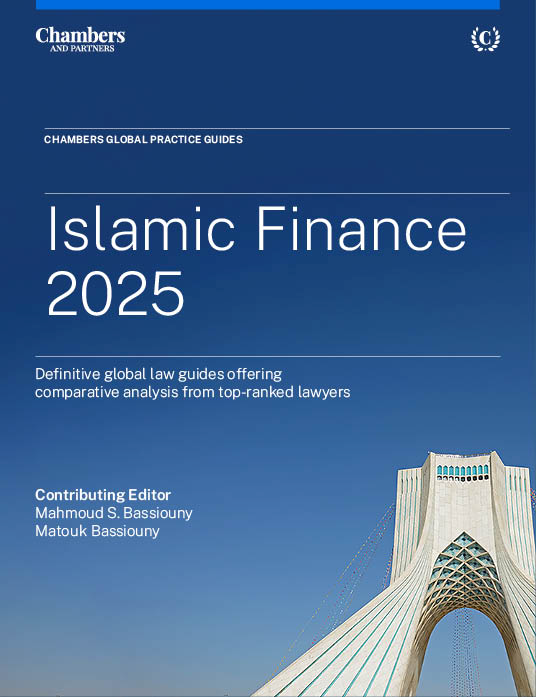
Islamic Finance 2025
The new Islamic Finance 2025 guide provides the latest legal information and up-to-date commentary, from across the Middle East and beyond, on Sharia compliance and standards, Islamic finance solutions for working capital needs, Islamic project finance products, Islamic finance and fintech, sukuk, tax laws and issues, and the future legal and regulatory outlook.
Last Updated: July 09, 2025
Compare law and practice by selecting locations and topic(s)
Select Locations

Select Topic(s)

Please select at least one location and one topic to use the compare functionality.
Islamic Finance Overview
Over the past decade, Islamic finance has emerged as a significant component of the global financial system. With total assets surpassing USD3.88 trillion by the end of 2024, according to recent estimates by the Islamic Financial Services Board (IFSB), the sector has not only demonstrated resilience in the face of global economic shocks – including the COVID-19 pandemic and geopolitical disruptions – but also matured into a sophisticated framework encompassing banking, capital markets, insurance (Takaful), and asset management. As we look ahead to the remainder of 2025 and beyond, a central question looms: will Islamic finance continue to consolidate its gains, or are we on the cusp of a new era of innovation and global integration?
Key jurisdictions in the GCC and Southeast Asia, as well as financial centres in Europe and Africa, are actively shaping the future of the practice, supported by robust demographic tailwinds and a growing appetite for ethical, Sharia-compliant financial solutions.
Islamic finance transactions are typically governed by the general financial laws and regulations applicable to the banking and non-banking sectors, rather than through a standalone Islamic finance code. Oversight is generally divided between regulatory authorities responsible for banking activities and those overseeing capital markets and insurance. These regulators supervise the offering of Islamic financial products such as Murabaha, Ijara (leasing), Sukuk, and Takaful within the broader financial framework. Definitions of various Islamic financial products can be found, for example, in the Egypt Law and Practice chapter of Chambers’ Islamic Finance 2025 Guide, in 3.1 Murabaha, Mudarabah and Musharakah and 5.1 Sukuk Overview, as well as in the Kuwait Trends and Developments article.
Although there may not be a dedicated Islamic finance law in many jurisdictions, the legal recognition of Sharia principles is often reflected in the constitution or primary legal texts. Financial institutions offering Sharia-compliant services are usually required to establish internal Sharia Supervisory Boards, which review and certify compliance of financial products with Islamic principles. In some cases, these internal boards operate under the guidance or oversight of centralised Sharia committees affiliated with financial regulators, helping to ensure consistency and compliance across the sector.
The offering of Islamic financial products generally falls under the scope of existing financial regulations and requires authorisation from the relevant banking or capital markets regulators. A financial institution intending to operate as a fully fledged Islamic bank or provide Islamic financial services through dedicated business lines typically must obtain prior licensing from the competent regulatory authority, in line with general banking or financial services regulations.
In the non-banking sector, entities wishing to issue Sukuk or offer other Sharia-compliant investment products are usually required to obtain a separate licence or approval from the authority responsible for capital markets. Similarly, providers of Islamic insurance must secure appropriate authorisation under the applicable insurance or financial services framework.
This structure ensures that Islamic finance activities are held to the same prudential, licensing and compliance standards as conventional finance, while also addressing the unique requirements of Sharia-compliant products.
Market landscape and growth
The Islamic finance market is active and expanding across various sectors. It includes a broad range of retail and corporate offerings, including vehicle financing, home financing, microfinance, and commercial instruments such as Murabaha, Ijara, and Istisna’a. In many jurisdictions, both fully fledged Islamic banks and conventional institutions with Islamic windows participate in the market, offering Sharia-compliant services to individuals, businesses, and government entities.
Beyond traditional banking, the Islamic finance ecosystem continues to grow through the development of non-banking sectors such as Takaful, real estate financing, and Islamic microfinance. This demonstrates increasing demand for ethical financial alternatives, supported by evolving regulatory frameworks and market infrastructure that ensure compliance with Sharia while meeting modern financial needs.
Several jurisdictions have implemented targeted policy measures to support and grow Islamic finance. These initiatives often include regulatory reforms, tax incentives, and the establishment of dedicated vehicles to facilitate Sharia-compliant financing tools such as Sovereign Sukuk. In some cases, governments have created special-purpose entities to manage the issuance of Sukuk for infrastructure, development, or budget financing, aligning these efforts with broader strategies for financial inclusion and market diversification.
Moreover, legislative updates in certain markets have clarified the regulatory treatment of Islamic instruments, such as aligning the tax treatment of Sukuk with conventional debt instruments. These policies aim to remove structural disadvantages, encourage innovation, and position Islamic finance as a core component of national financial systems.
Islamic finance is also embracing global trends in sustainability and technology. Two major areas of growth are sustainable finance, particularly the issuance of Green Sukuk, and the adoption of Islamic fintech solutions.
Emerging trends
Green Sukuk are increasingly being used to raise funds for environmentally responsible projects such as renewable energy, green buildings, and sustainable transportation. Several jurisdictions are now incorporating these instruments into their green finance strategies to attract socially responsible investors and expand access to ethical capital.
Simultaneously, Islamic fintech is gaining momentum. Start-ups and financial institutions are leveraging digital platforms to deliver Sharia-compliant financing, investment, and savings solutions. These innovations are helping to reach underbanked populations, reduce transaction costs, and make Islamic financial products more accessible and efficient.
Together, these developments illustrate the adaptability of Islamic finance to contemporary needs and its potential to support inclusive and sustainable economic growth.
Considerations
One of the key challenges in structuring Islamic finance transactions lies in the absence of a unified legal framework specifically tailored to Sharia-compliant contracts. This lack of harmonisation often results in varied interpretations by different Sharia Supervisory Boards, particularly regarding structures like Murabaha, Ijara, or Istisna’a. As a result, approval timelines can be prolonged, adding to the administrative burden and transactional costs.
Further complications arise from conventional legal and tax frameworks that are generally designed for interest-based lending. For example, stamp duties or tax implications may not align with the asset-based nature of Islamic finance, leading to inconsistencies or double charges. Practical requirements such as capital adequacy and liquidity ratios typically structured around interest-bearing instruments may impose disproportionately higher costs on Islamic financial institutions.
Moreover, many conventional risk management tools, such as interest rate swaps or conventional hedging instruments, are not permissible under Sharia. This limits the ability of Islamic institutions to hedge against currency or rate volatility, exposing them to additional market risks. Lastly, in many dual financial systems, Islamic and conventional assets must be accounted for separately, requiring institutions to implement parallel operational systems, which can increase overall costs by 10–15% and delay the rollout of new Sharia-compliant products.
In the context of Islamic finance, Sharia serves as a guiding framework for structuring transactions and ensuring ethical compliance. Regulators often collaborate with Sharia advisory boards to oversee financial products – such as Sukuk or Islamic funds – and ensure that they adhere to Islamic principles. This dual influence supports the broader integration of Islamic finance into national legal systems while maintaining the sector’s religious integrity.
Islamic financial institutions are generally regulated by a combination of central banking and financial market authorities. These regulators oversee compliance through licensing requirements, mandatory Sharia audits, and periodic inspections. In certain jurisdictions, ministries of finance may also play a role, especially in the issuance of Sovereign Sukuk or government-backed Islamic financial instruments.
Regulatory enforcement mechanisms include administrative fines for non-compliance, daily penalties for ongoing violations, corrective action orders, suspension or revocation of licences, and, in severe cases, referral for criminal investigation. These enforcement tools ensure that Sharia-compliant financial institutions are held to the same regulatory standards as their conventional counterparts, while accommodating the unique aspects of Islamic finance.
Disputes involving Islamic financial transactions are typically resolved through conventional civil or commercial court systems unless the parties have agreed to arbitration. There are generally no specialised Sharia courts designated exclusively for Islamic finance disputes in most jurisdictions.
However, if a dispute raises questions of Sharia compliance – such as whether or not a contract adheres to Islamic principles – courts may consider expert opinions from recognised Sharia scholars or rely on interpretations aligned with public policy and the legal framework. In arbitration settings, parties often include provisions for appointing arbitrators with expertise in both Islamic finance and commercial law to ensure a balanced resolution.
Transaction structures and conclusion
Islamic finance provides several structures that can effectively address the working capital needs of businesses while maintaining compliance with Sharia principles. The most commonly used instruments include: Murabaha (cost-plus sale), Mudarabah (profit-sharing partnership) and Musharakah (joint venture). These Sharia-compliant methods allow companies to access liquidity and manage cash flows without breaching Islamic prohibitions on interest or speculative financing.
Securitisation is generally implemented through the assignment of financial rights owed to a company by its debtors to a securitisation company, for the purpose of issuing securitisation bonds to investors. Once the assignment becomes effective, the assigned rights are no longer considered part of the assets of either the assigning company or the securitisation company. The assigning company bears no liability for the fulfilment of any obligations arising from the assigned financial rights after the assignment takes effect and shall have no further involvement, except for the potential role of acting as a servicer to collect the assigned receivables and transfer the proceeds to the relevant beneficiaries. Ownership of the assigned rights is limited exclusively to the holders of the securitisation bonds.
The sale of these rights to investors is typically structured on the basis of risk-sharing principles, allowing for a proportional allocation of any potential risks associated with the assigned financial rights across all investors.
This structure serves as a key factor in attracting banks and investors, particularly those seeking Sharia-compliant investment opportunities to participate in bond offerings issued under such frameworks.


